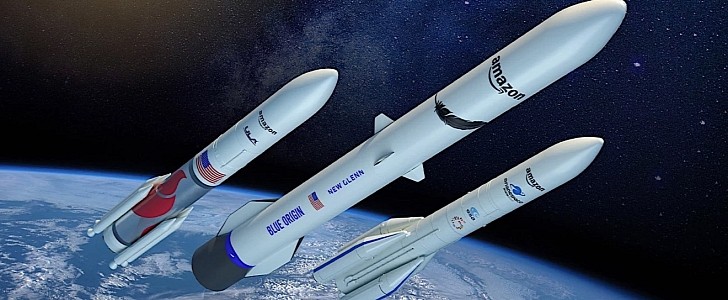Ever since space startups opened up Earth’s orbit for pretty much anyone with the resources to put stuff up there, a wealth of new ideas came to life. One of the most exciting: providing people here on Earth with broadband beamed down from space.
It all started, on a large scale, with SpaceX and the Starlink constellation, the largest of its kind currently in operation, with over 2,300 satellites already deployed, and about as many to follow.
Then, there’s OneWeb, which after fighting all sorts of problems, including a bankruptcy and now Russia’s stubbornness of cutting all ties with the world, intends to deploy over 600 broadband satellites in orbit.
And finally, here comes Amazon. The behemoth too is trying to have a piece of what promises to be a very large pie and to get there it has come up with something called Project Kuiper. The company aims to deliver a total of 3,236 satellites into low-Earth orbit with the goal of “providing reliable, affordable broadband service to unserved and underserved communities around the world.”
Until this week, despite Amazon having been born from the same mind that created Blue Origin, it was unclear how all these pieces of hardware will reach their destination in a reasonable amount of time. Now, after announcing it has secured no less than 83 launches for the Kuiper satellites, Amazon seems to have cleared things up a bit.
Three companies are tasked with getting them in position, and as you might have guessed already, SpaceX is not among them.
The biggest contract went to United Launch Alliance, which will lift satellites 38 times using the Vulcan Centaur rocket. Arianespace’s Ariane 6 rocket will launch 18 times, and Blue Origin's New Glenn will take off 12 times with Kuipers on board. The rest of the 15 launches are yet to be assigned.
The plan is to have the first satellites in orbit by the end of this year, with the first two departing onboard ABL Space Systems' RS1 rocket.
Once operational, the constellation “will serve individual households, as well as schools, hospitals, businesses, disaster relief efforts, government agencies, and other organizations operating in places without reliable broadband.”
Then, there’s OneWeb, which after fighting all sorts of problems, including a bankruptcy and now Russia’s stubbornness of cutting all ties with the world, intends to deploy over 600 broadband satellites in orbit.
And finally, here comes Amazon. The behemoth too is trying to have a piece of what promises to be a very large pie and to get there it has come up with something called Project Kuiper. The company aims to deliver a total of 3,236 satellites into low-Earth orbit with the goal of “providing reliable, affordable broadband service to unserved and underserved communities around the world.”
Until this week, despite Amazon having been born from the same mind that created Blue Origin, it was unclear how all these pieces of hardware will reach their destination in a reasonable amount of time. Now, after announcing it has secured no less than 83 launches for the Kuiper satellites, Amazon seems to have cleared things up a bit.
Three companies are tasked with getting them in position, and as you might have guessed already, SpaceX is not among them.
The biggest contract went to United Launch Alliance, which will lift satellites 38 times using the Vulcan Centaur rocket. Arianespace’s Ariane 6 rocket will launch 18 times, and Blue Origin's New Glenn will take off 12 times with Kuipers on board. The rest of the 15 launches are yet to be assigned.
The plan is to have the first satellites in orbit by the end of this year, with the first two departing onboard ABL Space Systems' RS1 rocket.
Once operational, the constellation “will serve individual households, as well as schools, hospitals, businesses, disaster relief efforts, government agencies, and other organizations operating in places without reliable broadband.”







